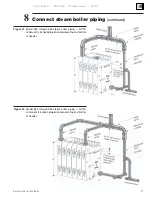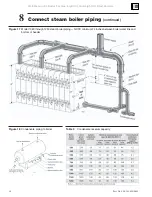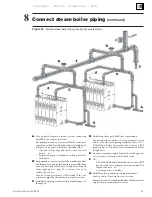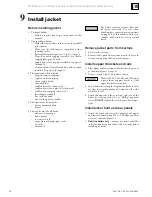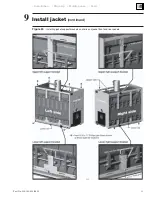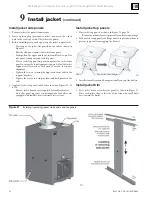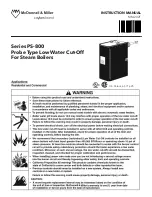
• Installation • Start-Up • Maintenance • Parts
31
Part No. 550-141-935/0602
13
Connect breeching and venting systems
Figure 31
Stub vent – forced draft —
single boiler
Figure 33
Conventional chimney –
balanced draft with barometric
draft control when required —
single boiler
Figure 32
Stub vent – forced draft —
multiple boilers
Figure 34
Conventional chimney –
balanced draft with barometric
draft control when required —
multiple boilers
General venting information
•
Model 80 boilers operate with positive overfire pressure. Adjust
damper assembly (see page 33) during burner start-up to achieve
0.1" W.C. positive pressure at damper sample hole.
Select type of venting system
Forced draft
Boiler, breeching and stub vent operate at positive pressure. Entire
system must be gas-tight to prevent leaks. Stub vent height must be
limited to prevent negative draft with 3-foot minimum stub vent
height above roof. See Figures 31 and 32.
Balanced draft
Boiler operates with positive pressure overfire. Chimney
may
provide
excess draft which may require a barometric draft control installed
and set to provide minimum draft to maintain 0.1" positive pressure
at flue collar. Minimum chimney height above roof is 3 feet. See
Figures 33 and 34.
Construct metal breeching:
•
See Table 14 or Table 15 for minimum breeching diameter.
•
Select material type and thickness in compliance with local codes.
Conventional flue pipe should not be used as it could
leak flue gases and carbon monoxide emissions
through seams and joints, resulting in severe
personal injury or death.
•
Refer to ASHRAE Guide for chimney and breeching calculations
and construction and lining.
Long horizontal breechings, excessive number of
tees and elbows or other obstructions restricting
combustion gas flow can result in possibility of
condensation, flue gas leakage and carbon monoxide
emissions, causing severe personal injury or death.
Table 14
Minimum breeching diameter —
forced draft venting
Table 15
Minimum breeching diameter —
balanced draft venting

